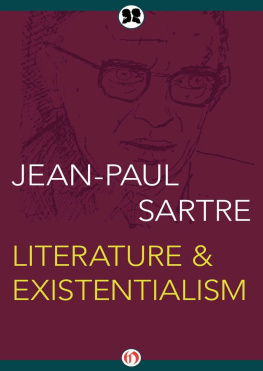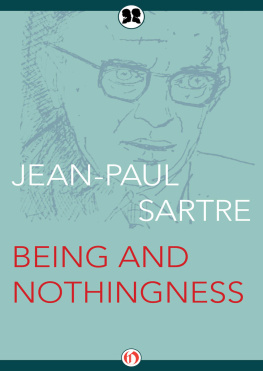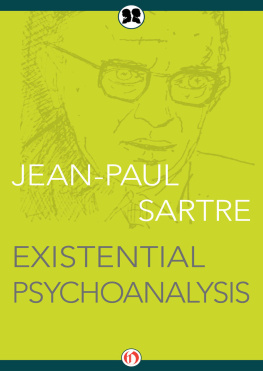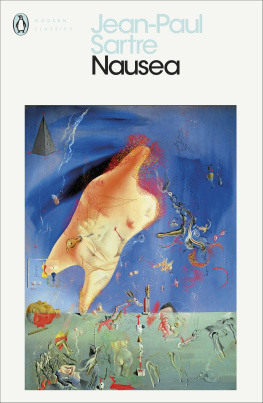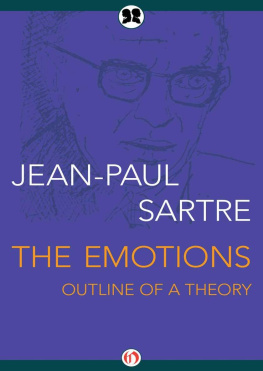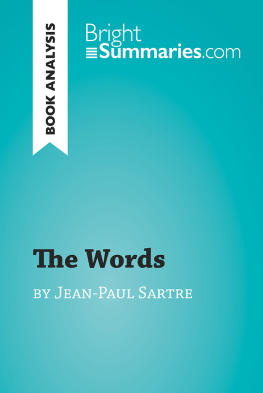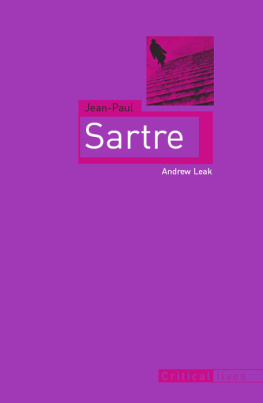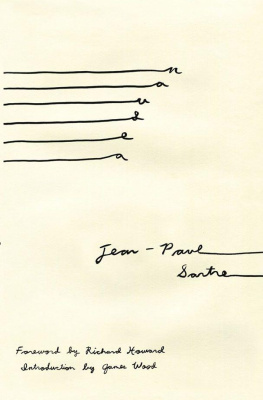Literature & Existentialism
Jean-Paul Sartre
Translated from the French by
Bernard Frechtman
Philosophical Library

TABLE OF CONTENTS
FOREWORD
If you want to engage yourself, writes a young imbecile, what are you waiting for? Join the Communist Party. A great writer who engaged himself often and disengaged himself still more often, but who has forgotten, said to me, The worst artists are the most engaged. Look at the Soviet painters. An old critic gently complained, You want to murder literature. Contempt for belles-lettres is spread out insolently all through your review. A petty mind calls me pigheaded, which for him is evidently the highest insult. An author who barely crawled from one war to the other and whose name sometimes awakens languishing memories in old men accuses me of not being concerned with immortality; he knows, thank God, any number of people whose chief hope it is. In the eyes of an American hack-journalist the trouble with me is that I have not read Bergson or Freud; as for Flaubert, who did not engage himself, it seems that he haunts me like remorse. Smart-alecks wink at me, And poetry? And painting? And music? You want to engage them, too? And some martial spirits demand, Whats it all about? Engaged literature? Well, its the old socialist realism, unless its a revival of populism, only more aggressive.
What nonsense. They read quickly, badly, and pass judgment before they have understood. So lets begin all over. This doesnt amuse anyone, neither you nor me. But we have to hit the nail on the head. And since critics condemn me in the name of literature without ever saying what they mean by that, the best answer to give them is to examine the art of writing without prejudice. What is writing? Why does one write? For whom? The fact is, it seems that nobody has ever asked himself these questions.
I
WHAT IS WRITING?
No, we do not want to engage painting, sculpture, and music too, or at least not in the same way. And why would we want to? When a writer of past centuries expressed an opinion about his craft, was he immediately asked to apply it to the other arts? But today its the thing to do to talk painting in the argot of the musician or the literary man and to talk literature in the argot of the painter, as if at bottom there were only one art which expressed itself indifferently in one or the other of these languages, like the Spinozistic substance which is adequately reflected by each of its attributes.
Doubtless, one could find at the origin of every artistic calling a certain undifferentiated choice which circumstances, education, and contact with the world particularized only later. Besides, there is no doubt that the arts of a period mutually influence each other and are conditioned by the same social factors. But those who want to expose the absurdity of a literary theory by showing that it is inapplicable to music must first prove that the arts are parallel.
Now, there is no such parallelism. Here, as everywhere, it is not only the form which differentiates, but the matter as well. And it is one thing to work with color and sound, and another to express oneself by means of words. Notes, colors, and forms are not signs. They refer to nothing exterior to themselves. To be sure, it is quite impossible to reduce them strictly to themselves, and the idea of a pure sound, for example, is an abstraction. As Merleau-Ponty has pointed out in The Phenomenology of Perception, there is no quality of sensation so bare that it is not penetrated with signification. But the dim little meaning which dwells within it, a light joy, a timid sadness, remains immanent or trembles about it like a heat mist; it is color or sound. Who can distinguish the green apple from its tart gaiety? And arent we already saying too much in naming the tart gaiety of the green apple? There is green, there is red, and that is all. They are things, they exist by themselves.
It is true that one might, by convention, confer the value of signs upon them. Thus, we talk of the language of flowers. But if, after the agreement, white roses signify fidelity to me, the fact is that I have stopped seeing them as roses. My attention cuts through them to aim beyond them at this abstract virtue. I forget them. I no longer pay attention to their mossy abundance, to their sweet stagnant odor. I have not even perceived them. That means that I have not behaved like an artist. For the artist, the color, the bouquet, the tinkling of the spoon on the saucer, are things, in the highest degree. He stops at the quality of the sound or the form. He returns to it constantly and is enchanted with it. It is this color-object that he is going to transfer to his canvas, and the only modification he will make it undergo is that he will transform it into an imaginary object. He is therefore as far as he can be from considering colors and signs as a language.
What is valid for the elements of artistic creation is also valid for their combinations. The painter does not want to create a thing. And if he puts together red, yellow, and green, there is no reason for the ensemble to have a definable signification, that is, to refer particularly to another object. Doubtless this ensemble is also inhabited by a soul, and since there must have been motives, even hidden ones, for the painter to have chosen yellow rather than violet, it may be asserted that the objects thus created reflect his deepest tendencies. However, they never express his anger, his anguish, or his joy as do words or the expression of the face; they are impregnated with these emotions; and in order for them to have crept into these colors, which by themselves already had something like a meaning, his emotions get mixed up and grow obscure. Nobody can quite recognize them there.
Tintoretto did not choose that yellow rift in the sky above Golgotha to signify anguish or to provoke it. It is anguish and yellow sky at the same time. Not sky of anguish or anguished sky; it is an anguish become thing, an anguish which has turned into yellow rift of sky, and which thereby is submerged and impasted by the proper qualities of things, by their impermeability, their extension, their blind permanence, their externality, and that infinity of relations which they maintain with other things. That is, it is no longer readable. It is like an immense and vain effort, forever arrested half-way between sky and earth, to express what their nature keeps them from expressing.
Similarly, the signification of a melodyif one can still speak of significationis nothing outside of the melody itself, unlike ideas, which can be adequately rendered in several ways. Call it joyous or somber. It will always be over and above anything you can say about it. Not because its passions, which are perhaps at the origin of the invented theme, have, by being incorporated into notes, undergone a transubstantiation and a transmutation. A cry of grief is a sign of the grief which provokes it, but a song of grief is both grief itself and something other than grief. Or, if one wishes to adopt the existentialist vocabulary, it is a grief which does not exist any more, which is. But, you will say, suppose the painter does houses? Thats just it. He makes them, that is, he creates an imaginary house on the canvas and not a sign of a house. And the house which thus appears preserves all the ambiguity of real houses.
The writer can guide you and, if he describes a hovel, make it seem the symbol of social injustice and provoke your indignation. The painter is mute. He presents you with a hovel, thats all. You are free to see in it what you like. That attic window will never be the symbol of misery; for that, it would have to be a sign, whereas it is a thing. The bad painter looks for the type. He paints the Arab, the Child, the Woman; the good one knows that neither the Arab nor the proletarian exists either in reality or on his canvas. He offers a workman, a certain workman. And what are we to think about a workman? An infinity of contradictory things. All thoughts and all feelings are there, adhering to the canvas in a state of profound undifferentiation. It is up to you to choose. Sometimes, high-minded artists try to move us. They paint long lines of workmen waiting in the snow to be hired, the emaciated faces of the unemployed, battlefields. They affect us no more than does Greuze with his Prodigal Son. And that masterpiece, The Massacre of Guernica, does any one think that it won over a single heart to the Spanish cause? And yet something is said that can never quite be heard and that would take an infinity of words to express. And Picassos long harlequins, ambiguous and eternal, haunted with inexplicable meaning, inseparable from their stooping leanness and their pale diamond-shaped tights, are emotion become flesh, emotion which the flesh has absorbed as the blotter absorbs ink, and emotion which is unrecognizable, lost, strange to itself, scattered to the four corners of space and yet present to itself.
Next page
